The Staff Selection Commission (SSC) conducts the Combined Higher Secondary Level (CHSL) examination every year for recruitment to posts like Lower Division Clerk (LDC), Junior Secretariat Assistant (JSA), and Data Entry Operator (DEO). Lakhs of aspirants apply for this competitive exam, and to succeed, it is crucial to understand the exam pattern, syllabus, and previous year trends. By analyzing the Most Important Topics for SSC CHSL 2026 and their weightage, candidates can prepare more strategically and increase their chances of scoring high.
Most Important Topics for SSC CHSL 2026 Based on Previous Year Trends
Understanding the most important topics helps aspirants prioritize their preparation. Previous year papers show consistent patterns, where certain topics are asked frequently and carry more weightage. Since Tier-1 and Tier-2 overlap in many areas, focusing on these high-weightage topics is a smart approach.
Check: SSC CHSL City Intimation 2025 Out
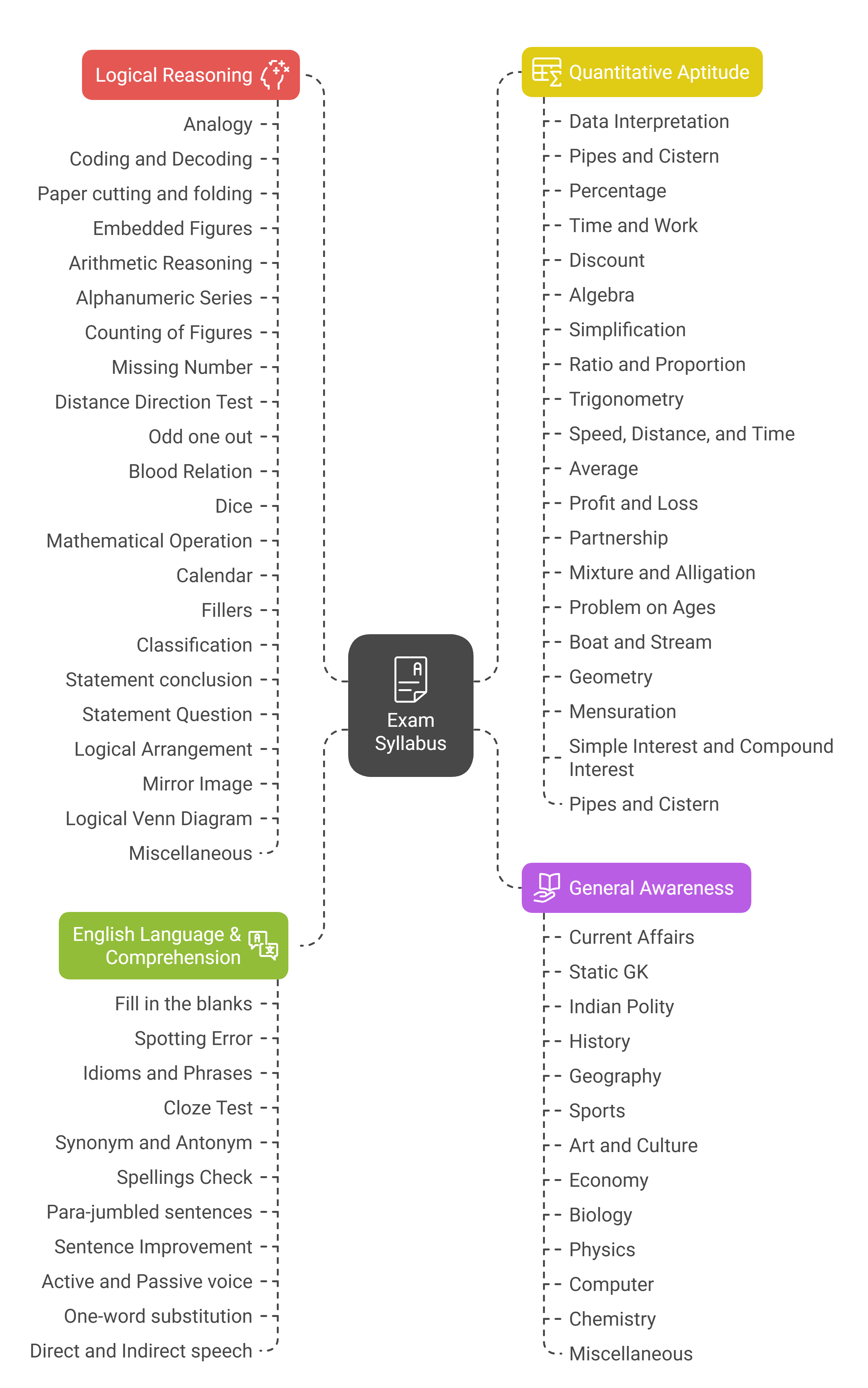
SSC CHSL Exam Pattern and Syllabus
Before diving into preparation, candidates must be well aware of the exam pattern and syllabus. The CHSL exam is conducted in two tiers – Tier-1 and Tier-2. Each SSC CHSL stage tests different skills, but there is also an overlap in certain subjects, making it essential to prepare thoroughly from the beginning.
Check: SSC CHSL City Intimation 2025 Out
SSC CHSL Tier-1
Tier-1 is the first stage of the examination and is objective in nature. It consists of four subjects – General Intelligence and Reasoning, General Awareness, Quantitative Aptitude, and English Language. Each subject carries equal marks, and performance here decides whether a candidate proceeds to the next stage.
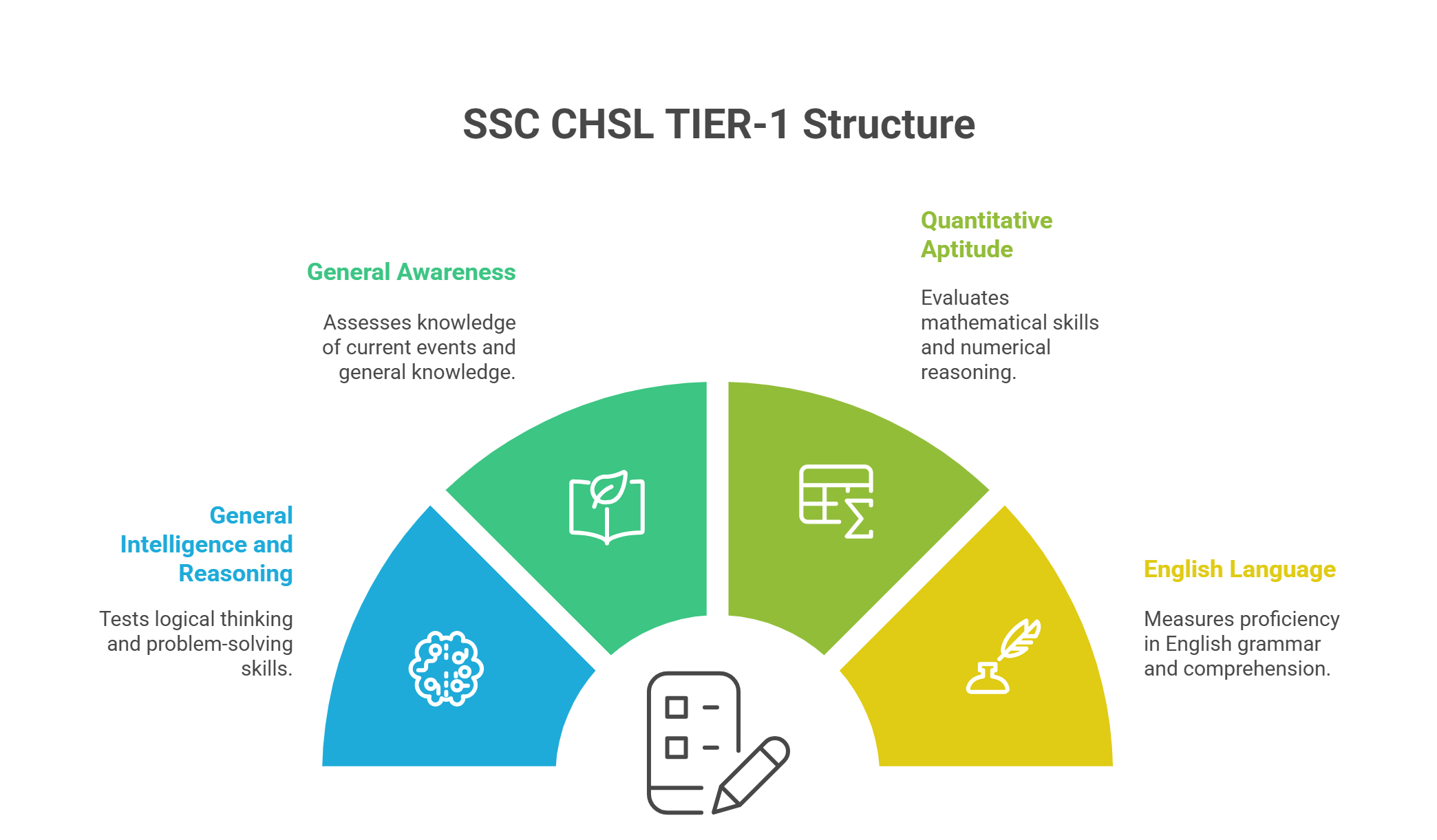
SSC CHSL Tier-1: Important Topics
Tier-1 is often considered the screening stage, but it plays a key role in determining selection. Accuracy, speed, and knowledge of scoring topics are vital. Let’s look at the subject-wise important topics:
English Language
The English section checks grammar, vocabulary, and comprehension skills. Most questions come from areas like grammar corrections, sentence structure, and word usage. A strong vocabulary and regular practice can ensure good marks.
| Topic | Weightage (No. of Qs) |
|---|---|
| Fill in the blanks | 1–6 |
| Spotting Errors | 1–5 |
| Idioms & Phrases | 1–3 |
| Cloze Test | 1–5 |
| Synonyms & Antonyms | 0–4 |
| Spellings | 1–5 |
| Para-jumbled Sentences | 0–2 |
| Sentence Improvement | 1–2 |
| Active/Passive Voice | 0–1 |
| One-word Substitution | 1–3 |
| Direct/Indirect Speech | 1–2 |
Quantitative Aptitude
Quantitative Aptitude measures calculation ability and problem-solving speed. Geometry, Algebra, and Data Interpretation are highly important, while basics like Percentages and Averages are also frequently tested.
| Topic | Weightage (No. of Qs) |
|---|---|
| Data Interpretation | 3–5 |
| Percentage | 1–2 |
| Time & Work | 1–2 |
| Algebra | 2–3 |
| Trigonometry | 0–3 |
| Geometry | 2–3 |
| Mensuration | 2–3 |
| Simplification | 0–1 |
| Ratio & Proportion | 0–3 |
| Speed, Time & Distance | 1–2 |
| Profit & Loss | 0–2 |
| Average | 0–3 |
| SI & CI | 0–2 |
| Mixture & Alligation | 0–2 |
| Problems on Ages | 0–2 |
| Boats & Streams | 0–1 |
Logical Reasoning
This section checks logical thinking and analytical ability. Topics like Analogy, Series, and Coding-Decoding appear regularly, and mastering them can secure quick marks.
| Topic | Weightage (No. of Qs) |
|---|---|
| Analogy | 1–6 |
| Coding-Decoding | 0–3 |
| Arithmetic Reasoning | 0–5 |
| Alphanumeric Series | 1–5 |
| Missing Number | 2–5 |
| Odd One Out | 2–3 |
| Mathematical Operations | 1–3 |
| Classification | 0–3 |
| Logical Arrangement | 0–4 |
| Blood Relations | 0–1 |
| Calendar | 0–1 |
| Mirror Image | 0–2 |
| Venn Diagram | 0–2 |
| Miscellaneous | 2–3 |
General Awareness
GA is the most scoring section in Tier-1. It covers current affairs, static GK, polity, and science. With consistent preparation, candidates can easily attempt 10–15 questions correctly.
| Topic | Weightage (No. of Qs) |
|---|---|
| Current Affairs | 5–7 |
| Static GK | 1–5 |
| Polity | 2–4 |
| History | 0–3 |
| Geography | 0–2 |
| Economy | 0–2 |
| Science (Phy/Chem/Bio) | 0–3 |
| Sports | 0–3 |
| Art & Culture | 0–2 |
| Miscellaneous | 4–5 |
SSC CHSL Tier-2
Tier-2 is more detailed and has both objective questions and skill/typing tests. It is conducted in two sessions on the same day. Session I includes reasoning, maths, English, GA, and computer knowledge, while Session II includes skill/typing tests depending on the post applied for. Importantly, Tier-2 also carries negative marking of 1 mark for each incorrect answer.
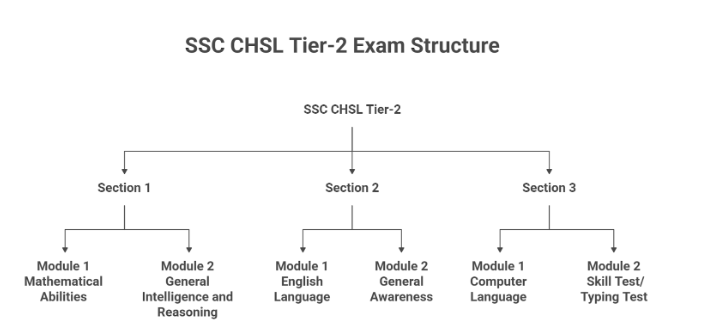
SSC CHSL Tier-2: Important Topics
Tier-2 is more detailed, with advanced reasoning, maths, English comprehension, and current affairs. Since it has negative marking, accuracy plays an even bigger role here.
General Intelligence & Reasoning
This section becomes slightly tougher in Tier-2 compared to Tier-1. Series, Analogy, and Coding-Decoding are the most commonly asked topics.
| Topic | Weightage (No. of Qs) |
|---|---|
| Series | 4–7 |
| Analogy | 3–5 |
| Coding-Decoding | 3–4 |
| Dictionary Based | 2–3 |
| Classification | 2–3 |
| Mathematical Inequalities | 2 |
| Blood Relations | 1–2 |
| Syllogism | 1 |
| Arrangement & Pattern | 2 |
| Puzzles | 0–1 |
| Cubes & Dice | 0–1 |
Quantitative Aptitude
Maths in Tier-2 demands more in-depth problem-solving. Geometry, Data Interpretation, and Trigonometry carry the highest weightage, so they should be a top priority in preparation.
| Topic | Weightage (No. of Qs) |
|---|---|
| Geometry | 6 |
| Data Interpretation | 4 |
| Trigonometry | 3 |
| Speed, Time & Distance | 3 |
| Profit & Loss | 2 |
| Time & Work | 2 |
| Mensuration | 2 |
| Algebra | 2 |
| Ratio & Proportion | 3 |
| Percentage | 1 |
| Average | 1 |
| Interest | 1 |
English Language & Comprehension
This section checks grammar, vocabulary, and comprehension ability in greater detail than Tier-1. Reading Comprehension and Cloze Test dominate the section.
| Topic | Weightage (No. of Qs) |
|---|---|
| Reading Comprehension | 10 |
| Cloze Test | 5 |
| Synonyms & Antonyms | 4–6 |
| Idioms & Phrases | 3–4 |
| Error Spotting | 2–3 |
| Spelling Check | 2–3 |
| Phrase Replacement | 2–3 |
| Voice | 2 |
| Speech | 1 |
| One-word Substitution | 2–3 |
| Fillers | 2 |
| Para Jumbles | 2 |
| Sentence Rearrangement | 1–3 |
General Awareness
General Awareness in Tier-2 gives more importance to current events, science, and history. Regular updates and revision are key here.
| Topic | Weightage (No. of Qs) |
|---|---|
| Current Affairs | 4–7 |
| History | 2–4 |
| Polity | 1–2 |
| Science | 4 |
| Economy | 1 |
| Geography | 0–2 |
| Art & Culture | 1 |
| Static GK | 1–2 |
Preparation Tips for SSC CHSL 2026
Preparation for SSC CHSL is all about consistency and smart work. Candidates must plan subject-wise strategies while balancing practice and revision.
1. Time Management
Speed and accuracy are crucial. Attempt easy questions first and reserve time-consuming ones for later. This ensures maximum attempts without losing accuracy.
2. General Awareness as a Scoring Section
Unlike Quant and Reasoning, GA doesn’t require lengthy calculations. With regular study of current affairs and static GK, candidates can score well in less time.
3. Mock Tests and Analysis
Mock tests simulate exam conditions and reveal gaps in preparation. Every test should be analyzed thoroughly to identify mistakes, improve accuracy, and manage time better.
By analyzing the weightage of important topics and focusing preparation accordingly, aspirants can maximize their scores in both Tier-1 and Tier-2. With consistent practice, strong basics, and effective time management, cracking SSC CHSL 2026 becomes a realistic goal.

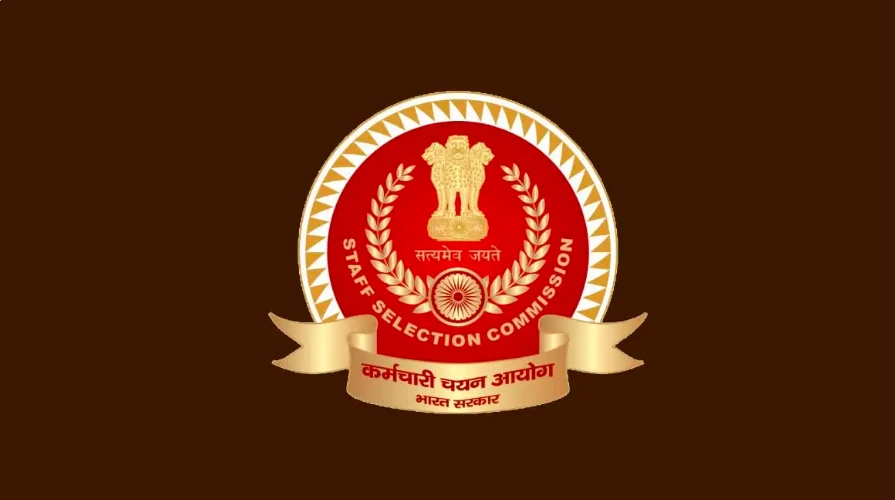
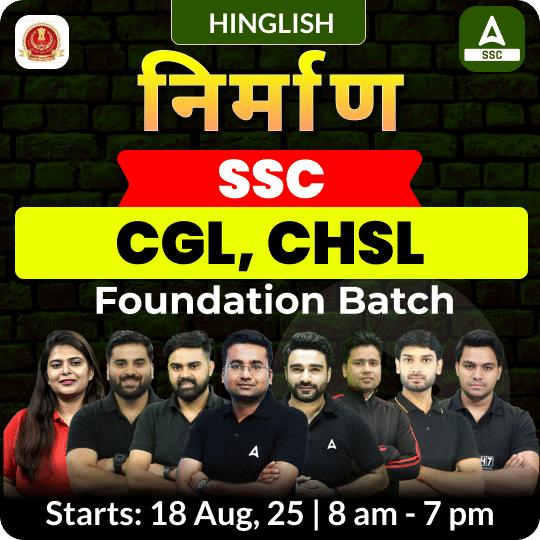

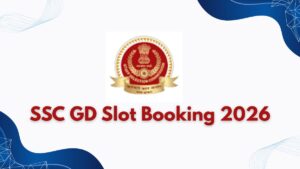 SSC GD Slot Booking 2026, Check Latest N...
SSC GD Slot Booking 2026, Check Latest N...
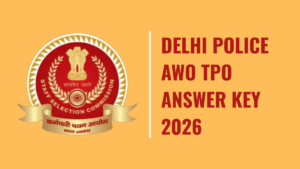 Delhi Police AWO TPO Answer Key 2026 Out...
Delhi Police AWO TPO Answer Key 2026 Out...
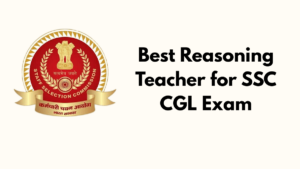 Best Reasoning Teacher for SSC CGL Exam
Best Reasoning Teacher for SSC CGL Exam
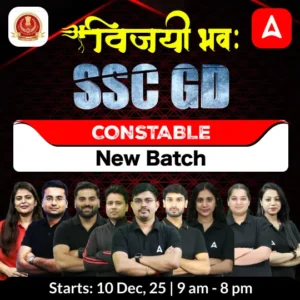
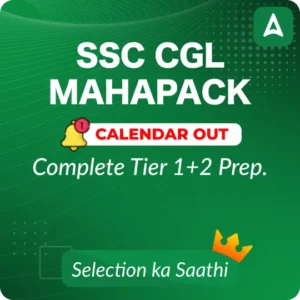
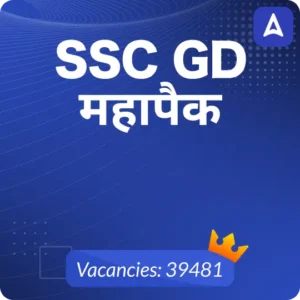
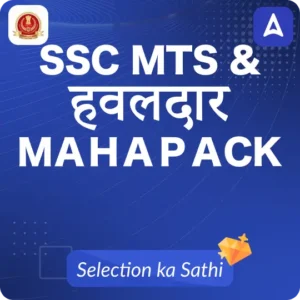

 Adda247 Job portal has complete information about all Sarkari Jobs and Naukri Alerts, its latest recruitment notifications, from all state and national level jobs and their updates.
Adda247 Job portal has complete information about all Sarkari Jobs and Naukri Alerts, its latest recruitment notifications, from all state and national level jobs and their updates.




